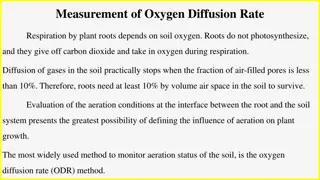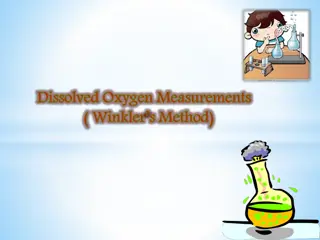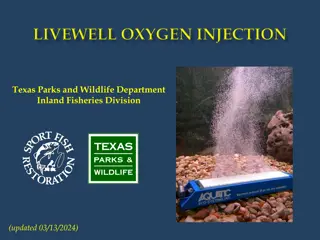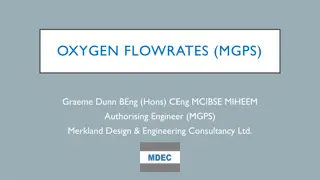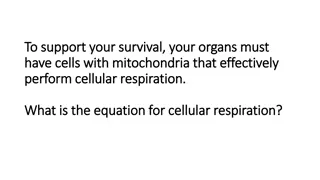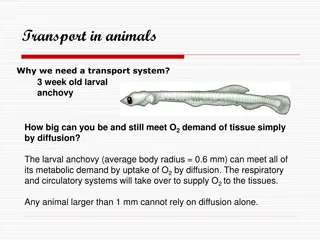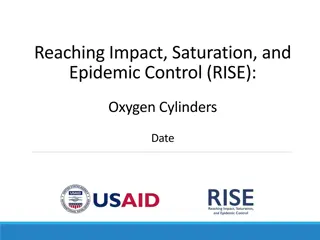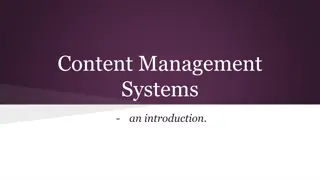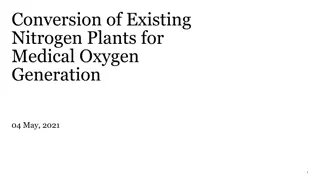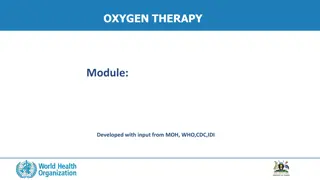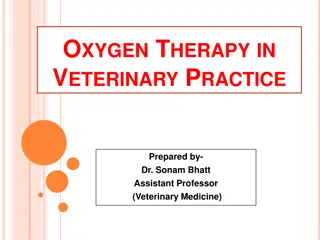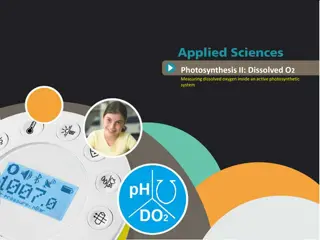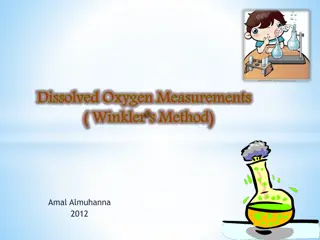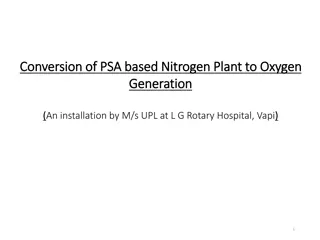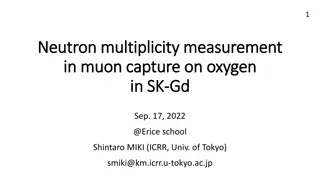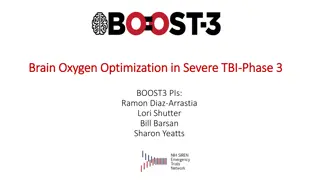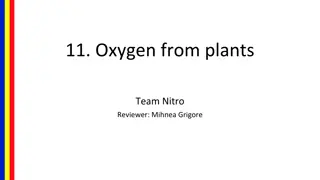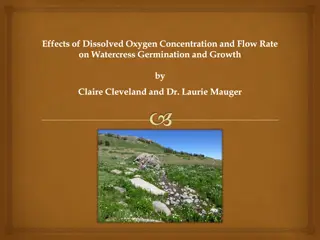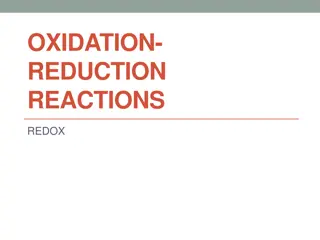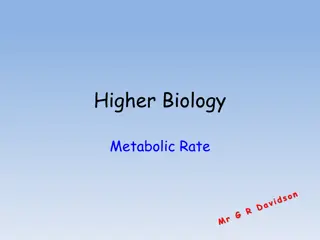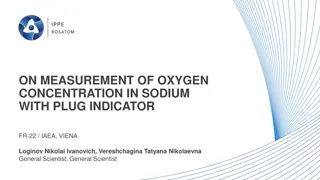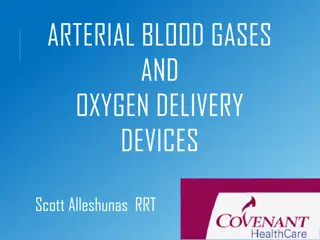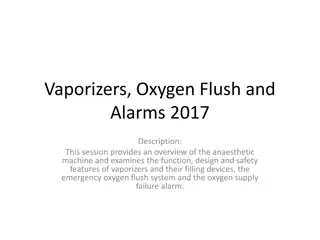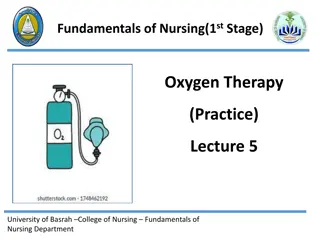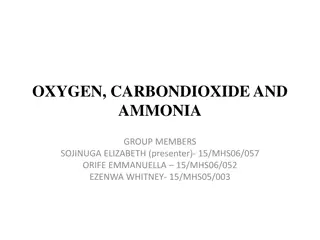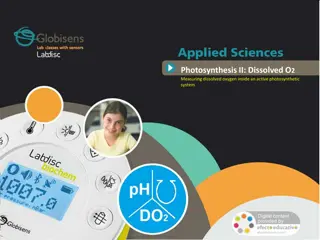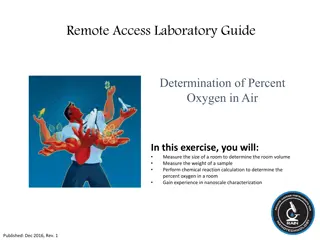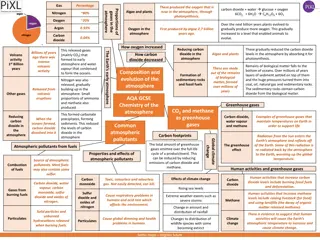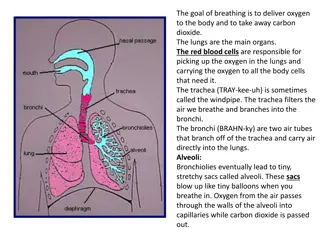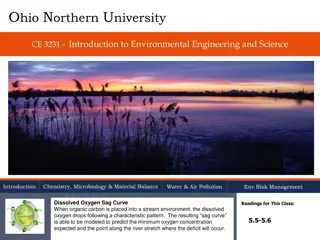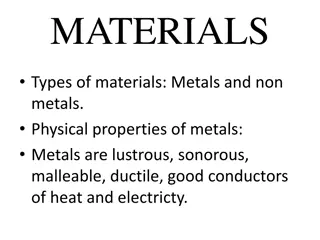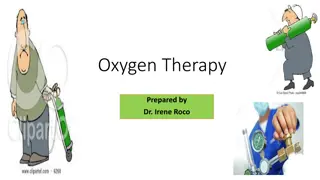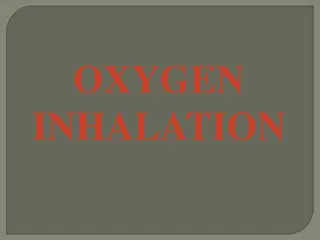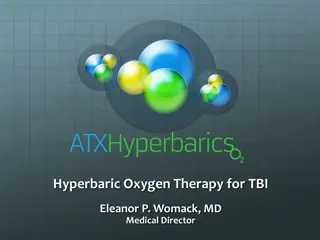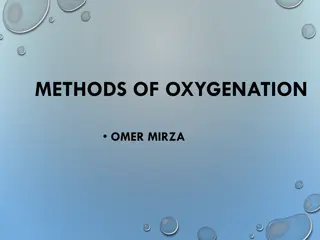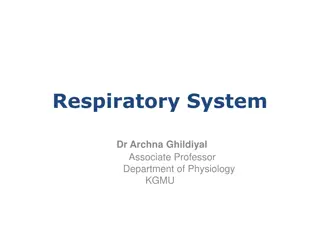Essential Medical Oxygen: Supply and Safety Guidelines
Medical oxygen is crucial in healthcare, especially during the COVID-19 pandemic. This resource explains its importance, use in various treatments, safety measures, and storage requirements. Learn about the significance of high-grade oxygen and the process of oxygen therapy delivery. Enhance your un
2 views • 48 slides
Understanding Oxygen Diffusion Rate Measurement in Plant Roots
Measurement of oxygen diffusion rate in plant roots is crucial for assessing soil oxygen levels and aeration conditions. The Oxygen Diffusion Rate (ODR) method utilizes a platinum microelectrode to simulate roots, allowing for the calculation of oxygen flux at the root-soil interface. By monitoring
1 views • 5 slides
Dissolved Oxygen Measurements and Factors Affecting Oxygen Levels
Understanding the importance of dissolved oxygen in water is crucial for the survival of aquatic plants and animals. Factors such as chemical reactions, temperature, pressure, and light penetration influence oxygen levels. The Winkler method is commonly used for dissolved oxygen measurements. This m
4 views • 11 slides
Maintaining Dissolved Oxygen Levels for Black Bass in Livewells
Dissolved oxygen is crucial for the health of black bass in livewells, especially during warmer months. This presentation explores the importance of oxygen equipment to maintain sufficient oxygen levels, recommends system components, and provides guidelines for installation, operation, and safety me
0 views • 14 slides
Evolution of Oxygen Flowrates in Healthcare Settings
Discussions around oxygen flowrates in healthcare facilities, especially in the context of the COVID-19 pandemic, highlight the need for a review of current guidelines. The existing (S)HTM 02-01 guidance, developed around 20 years ago, is being reevaluated to align with modern clinical practices. Pr
0 views • 11 slides
Exploring Dissolved Oxygen in Water: Importance and Impact
Delve into the world of dissolved oxygen in water, understanding its significance in measuring water quality in aquatic environments. Discover factors affecting dissolved oxygen levels, interpret data, and explore the impact of human activities on water quality.
1 views • 52 slides
Understanding Cellular Respiration and Oxygen Delivery
Cellular respiration, a vital process for organ survival, involves mitochondria performing cellular respiration by utilizing glucose and oxygen. Glucose is derived from diet or body breakdown, while oxygen enters through the respiratory system, facilitated by red blood cells in the circulatory syste
0 views • 8 slides
Importance of Transport System in Animals for Oxygen Supply
Animals require a transport system to meet tissue oxygen demands efficiently. The size limit for oxygen diffusion alone is around 1 mm due to the proportional increase in radius and diffusion properties. Blood is crucial for transporting oxygen, nutrients, waste products, cells, and heat, as well as
0 views • 17 slides
Comprehensive Guide to Oxygen Storage and Handling Methods
Explore the various methods of storing and handling oxygen, including types of storage devices, sources of medical oxygen, liquid oxygen containers, and cryogenic liquid cylinders. Learn about the different containers used, storage quantities, vaporization rates, and safety measures involved in stor
0 views • 61 slides
Understanding Content Management Systems
Content Management Systems (CMS) are computer applications that enable easy publishing, editing, and management of content on websites. They help in organizing, maintaining, and updating content efficiently from a centralized interface. With features like web-based publishing, revision control, and
4 views • 10 slides
Conversion of Nitrogen Plants for Oxygen Generation in Medical Industry
CPCB has identified industries with nitrogen plants that can be converted to produce oxygen without impacting normal operations. Conversion involves using Zeolite Molecular Sieve and PSA technology, with M/s. UPL Ltd successfully converting a plant at LG Rotary Hospital in Gujarat within 72 hours. S
0 views • 15 slides
Importance of Oxygen Therapy in Managing Respiratory Illnesses
Oxygen therapy is crucial in treating hypoxemia and saving lives, especially in patients with severe acute respiratory infections like COVID-19. This module covers the significance of oxygen therapy, indications for its use, methods to measure blood oxygen levels, and how to titrate oxygen therapy e
2 views • 22 slides
Oxygen Therapy in Veterinary Practice
Oxygen therapy is a crucial intervention in veterinary medicine, especially in emergency situations to address hypoxia and increase oxygen delivery to tissues. It involves delivering high concentrations of oxygen to optimize oxygen levels in the blood. Indications for oxygen therapy include hypoxia
1 views • 15 slides
Understanding Photosynthesis and Measuring Dissolved Oxygen
Explore the process of photosynthesis and the importance of dissolved oxygen within a photosynthetic system. Discover how environmental factors like light intensity influence the rate of photosynthesis, and learn how to measure dissolved oxygen using the SensorLab air pressure sensor. Engage in an e
0 views • 22 slides
Dissolved Oxygen Measurement and Factors Affecting Oxygen Levels
The content highlights the importance of measuring dissolved oxygen levels in water bodies for aquatic life survival. It explains the factors influencing oxygen concentrations, the principles of Winkler's method for measurement, required materials, and the testing procedure involved. The significanc
0 views • 11 slides
Conversion of Nitrogen Plant to Oxygen Generation at L.G. Rotary Hospital, Vapi
Transformation of a PSA-based nitrogen plant into an oxygen generation system at L.G. Rotary Hospital in Vapi. The process involves utilizing PSA technology with a specific operation philosophy, molecular sieve types for O2 and N2 generation, and various modifications to adapt the plant for oxygen p
0 views • 6 slides
Neutron Multiplicity Measurement in Muon Capture on Oxygen in Super-Kamiokande
Explore the neutron multiplicity measurement in muon capture on oxygen using Super-Kamiokande, a water-Cherenkov detector located underground in Japan. Gadolinium was added to enhance neutron tagging efficiency, aiding in Supernova observation, proton decay rejection, and more. Neutron signals are t
0 views • 16 slides
Brain Oxygen Optimization in Severe Traumatic Brain Injury (BOOST3) Trials Overview
Overview of the BOOST3 trials focusing on brain oxygen optimization in severe traumatic brain injury patients. The trials involve multiple PIs, training sessions, and hands-on ancillary studies. Various design principles and organizational values are emphasized, with grant awards distributed to diff
0 views • 13 slides
Experimental Method for Measuring Oxygen Production in Green Plants
The reporter proposed an experimental method to measure oxygen production by an aquatic plant, highlighting the process and outcomes. While there were detailed explanations on photosynthesis, the report lacked essential elements such as explaining the choice of plant and the source of carbon dioxide
1 views • 5 slides
Impact of Dissolved Oxygen and Flow Rate on Watercress Germination and Growth
A study by Claire Cleveland and Dr. Laurie Mauger explores the effects of dissolved oxygen concentration and flow rate on watercress germination and growth. The research includes ecological markers, existing evidence, hypothesis, experimental design, and anecdotal results indicating that watercress
0 views • 15 slides
Understanding Oxidation-Reduction Reactions in Chemistry
Explore the concept of oxidation and reduction in chemistry, which are fundamental processes that occur simultaneously in oxidation-reduction reactions. Learn about the role of oxygen, different types of oxidation reactions beyond burning, such as bleaching stains, and the concept of reduction invol
0 views • 34 slides
Understanding Metabolic Rate in Biology: Measurement and Importance
Metabolic rate, the energy consumed by an organism in a specific time period, can be measured through heat energy, oxygen consumption, and carbon dioxide release. Various tools like calorimeters and respirometers are used for this purpose. The delivery of oxygen through efficient transport systems i
0 views • 28 slides
Measurement of Oxygen Concentration in Sodium with Plug Indicator FR-22
Determining oxygen concentration in sodium using plug indicators is crucial for experimental facilities and nuclear reactors. This involves lowering sodium temperature slowly until sodium oxide crystallization begins, indicating saturation temperature (TS). Several solubility equations exist for cal
0 views • 6 slides
Understanding Arterial Blood Gases and Oxygen Delivery Devices
Arterial blood gases (ABG) are obtained from arteries to assess acid-base balance and blood oxygen levels. The pH, PaCO2, PaO2, HCO3, and SaO2 are crucial values on an ABG report. These values reflect the blood's acid-base status, carbon dioxide levels, oxygen saturation, and more. The buffer system
0 views • 25 slides
Understanding Vaporizers, Oxygen Flush, and Alarms in Anesthetic Machines
This overview delves into the functionality and safety features of vaporizers, oxygen flush systems, and oxygen supply failure alarms in anesthetic machines. Learn how vaporizers work, their key design characteristics, and the importance of plenum vaporizers in anesthesia delivery.
0 views • 21 slides
Oxygen Therapy: Fundamentals and Practice Overview
Oxygen therapy is a vital intervention for individuals with respiratory conditions like COPD, pneumonia, asthma, and more. This practice involves administering supplemental oxygen to improve oxygen levels in the body, leading to enhanced energy levels and overall quality of life. Precautions and con
0 views • 28 slides
Understanding Oxygen: Uses, Effects, and Importance in Living Organisms
Oxygen, a vital nonmetallic element, plays a crucial role in various processes essential for living organisms. It is involved in energy production, metabolism, immune system support, and more. However, the lack of oxygen can lead to serious conditions like hypoxia. Learn about the uses, effects, and
0 views • 37 slides
Understanding Photosynthesis: Energy Conversion in Plants
Photosynthesis is a vital process where plants convert sunlight, carbon dioxide, and water into glucose and oxygen. This energy conversion is crucial for sustaining life on Earth, as it provides food for organisms and releases oxygen into the atmosphere. The process involves the utilization of chemi
0 views • 21 slides
Exploring Photosynthesis: Measuring Dissolved Oxygen in Photosynthetic Systems
Discover the significance of dissolved oxygen in photosynthesis and how environmental factors like light intensity influence the process. Engage in hands-on experiments to investigate the impact of varying light conditions on oxygen availability and photosynthetic rates.
0 views • 22 slides
Determining Percent Oxygen in Air Lab Guide
This laboratory exercise focuses on determining the percentage of oxygen in air through room volume measurement, sample weight analysis, and chemical reaction calculations. The background information covers the importance of oxygen, historical discoveries, combustion reactions, and the debunking of
0 views • 12 slides
Evolution of Earth's Atmosphere and the Role of Plants in Oxygen Production
Earth's atmosphere has evolved over billions of years, with plants and algae playing a crucial role in producing oxygen through photosynthesis. This process gradually increased oxygen levels, enabling the evolution of animals. The reduction of carbon dioxide levels by plants absorbing it for photosy
0 views • 4 slides
Understanding the Importance of Breathing and Respiratory System
Breathing plays a crucial role in delivering oxygen to the body and removing carbon dioxide. The respiratory system, including the lungs, trachea, bronchi, and alveoli, functions to facilitate this vital process. The diaphragm muscle helps in inhaling and exhaling, while the exchange of oxygen and c
0 views • 14 slides
Understanding Dissolved Oxygen Sag Curves in Environmental Engineering
Understanding the Dissolved Oxygen Sag Curve in streams is crucial for predicting oxygen depletion due to organic carbon input. Models like the Streeter-Phelps Model help in estimating minimum oxygen levels and distance downstream where deficits occur. This involves concepts like BOD, DO, mathematic
0 views • 14 slides
Oxygen Therapy in Emergency Medicine
Oxygen therapy is crucial in emergency medicine for treating hypoxemia and improving oxygenation levels in patients. It is essential for conditions like acute hypoxemia, carbon monoxide poisoning, and shock. Various oxygen delivery devices are used to administer oxygen effectively, such as nasal pro
0 views • 27 slides
Physical and Chemical Properties of Metals and Non-metals
Metals exhibit physical properties like lustrous appearance, ductility, malleability, and sound production. They are also good conductors of heat and electricity. Non-metals, on the other hand, are brittle, non-sonorous, and poor conductors of heat and electricity. The chemical properties include re
0 views • 13 slides
Comprehensive Guide to Oxygen Therapy and Safety Precautions
Oxygen therapy is a crucial medical intervention for various conditions, such as hypoxia, impaired gas exchange, and heart failure. This guide covers the administration of oxygen, types of oxygen supply, safety precautions, and devices used for oxygen delivery. Safety measures include avoiding smoki
0 views • 16 slides
Understanding Oxygen Inhalation in Medical Treatment
Oxygen inhalation is a vital medical intervention to treat low blood oxygen levels in children with respiratory issues. It helps manage hypoxia, maintain oxygen levels in the blood, and support normal cellular function. Common indications include cyanosis, breathlessness, anemia, and exposure to low
0 views • 44 slides
Hyperbaric Oxygen Therapy for Traumatic Brain Injury (TBI) - Benefits and Mechanisms Explained
Hyperbaric Oxygen Therapy (HBOT) is a cutting-edge treatment that involves providing oxygen in a pressurized environment to enhance oxygenation of body tissues beyond what red blood cells can deliver. This therapy, administered under controlled conditions, offers various physiological and cellular b
0 views • 15 slides
Comprehensive Guide to Oxygenation in Respiratory Care
Oxygenation is a vital aspect of medical care, involving the process of delivering oxygen to the body's cells. It includes measures such as Arterial Oxygen Saturation, Oxygen Delivery, Oxygen Consumption, and Oxygen Extraction. Understanding hypoxia and hypoxemia, as well as the mechanisms of hypoxe
0 views • 28 slides
Understanding Oxygen Transport in the Respiratory System
Explore the intricate process of oxygen transport in the respiratory system, covering topics such as the composition of air, gaseous transport, factors affecting oxygen-hemoglobin dissociation, atmospheric air composition, diffusion of gases, effects of water vapor, and the methods of oxygen transpo
0 views • 37 slides

